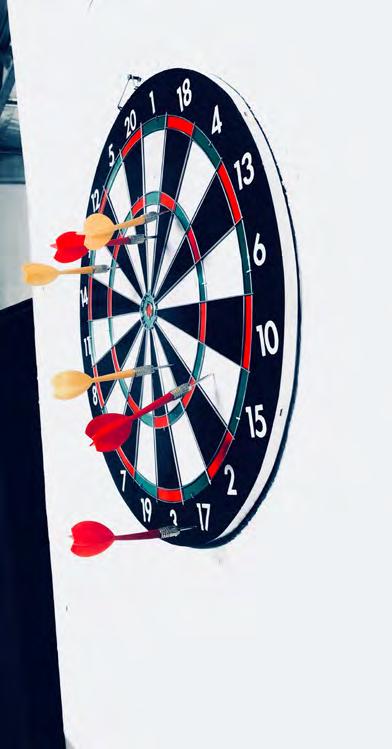
17 minute read
How to Keep from
from March/April 2020
THE SUPERSTAR PARADOX 5 Reasons Overachievers Miss the Mark
How overachievers can stop sabotaging their own success— or level of satisfaction after attaining superstar status
Advertisement
BY MERILEE KERN
In today’s fast-paced business climate, nothing is certain. Rapid-fire change, masses in business and work life have surrendered themselves to “overachievement” in pursuit of career success. Not just ordinary success, but rather the kind that exceeds expectations courtesy of excessive “above and beyond” effort put forth. Some relent to a life of overachievement willingly and enthusiastically as they yearn to earn, while others grievously succumb to a multitude of pressures (both external and self-inflicted) and work themselves to extremes in order to achieve and maintain an enviable stature and lifestyle overall.
Indeed, overachievement is a concept that’s seemingly become a gold standard on how to become a “superstar” in business, career goals and life overall. Just Google search “how to overachieve” and the web will dutifully deliver over 355,000 resources to help propel your prosperity.
While overachievement certainly has its tremendous share of virtues, having induced profound innovation, breakthroughs, productivity and abundance for individuals, organizations, industries and economies at large, there’s oft a dark side to this extreme approach to advancement. For some, yes, dreams come true, but throngs of others miss the mark despite best efforts. “This often happens because they’re aiming for achievements instead of at a deeper understanding of themselves and of what they want,” asserts Keren Eldad, a certified business coach and keynote speaker—trusted advisor to industry-leading executives, acclaimed entrepreneurs and premier organizations like Beyond Capital, Luxxotica, Van Cleef & Arpels, YPO, LVMH and IWC.
“It’s a silent story shared by many who present a happy, accomplished and enviable image: one of putting on pretenses and internally writhing with angst and anxiety, of never having enough, of insecurity, doubt and dissatisfaction—a state I have coined the ‘Superstar Paradox,’” Eldad said. “The paradox is when pursuing the illusory things we think we want actually produces undesirable results like strain to keep up low selfworth and general unhappiness—and those consequences actually impede our ability to attain what we want. It can become an exhausting and hugely debilitating vicious circle.” According to Eldad, the Superstar Paradox is a tough condition to solve because there’s one major, difficult hurdle to get past: admitting there’s a problem. “This requires relinquishing our main armor: that we know everything; that we have things ‘figured out,’” she said. “The key lies in accepting that ‘we don’t know what we don’t know’ and developing the courage and means to swap illusory happiness for a bona fide pursuit of wisdom that can bring true fulfillment, power and possibility.”
That’s easier said than done, of course, and as daunting and even enigmatic as it might seem, taking that proactive first step is critical. So, in the spirit of “starting somewhere,” Eldad offers the five foundational insights below to help ensure some of your overachievement behaviors or mindsets won’t actually be undermining your success—or your level of life satisfaction even after you’ve actually realized superstar status.
REFRAME YOUR SUCCESS STORY Overachievers often believe that success only comes from power, money or status. Yes, those things are important benchmarks for career measurement, but being successful in life overall should be the true Holy Grail. So, if you are a C-suite executive, or aspire to be, but are riddled with anxiety,
stress, pain and dissatisfaction–with relationships suffering in that wake–it’s evident that money and status isn’t proving as worthwhile as it can and should be.
To initiate needed change, be brave enough to reframe your personal story, from cover to cover. Life isn’t meant to be one-dimensional or even work-centered, so actually sit down and map out what you would hope for each facet of your life to look like if it were a true success. Sure, start with career goals to get the juices flowing, as that might come most easily, but then do separate exercises for as many other areas of your life that you can break down.
This can include marriage, children, extended family, friendships, professional networks, social media/networking, investments, travel, physical fitness, self-care/beauty, fashion and style, transportation, entertainment, hobbies and passions and so on. Life is abundant. You’ll soon see that life fulfillment means—and needs—so much more than what happens on the work front. It can be a means to an end, but there’s much in between. Once you start mapping it all out, you might come to the realization that you’ve been missing out on quite a lot in your quest for career glory. Reframe your success story with a more holistic approach—know what success “looks” like for each facet of your one and only life and commit (for real) to get there on all fronts.
GET OUT OF YOUR OWN WAY Even superstars create self-imposed limitations based on what they originally perceived their goal or benchmark of success to be. Once achieved, it’s instinctive to want to bask in that “place,” both emotional and physical. After all, you worked to extremes to get there. But, overachievers inevitably will want more, and then other kinds of self-imposed limitations kick in that are often founded on what we perceive our own capabilities and opportunities—or lack thereof—to be.
Even the most confident overachievers suffer the “can’t rant” internal dialogue. Take heed that "can’t" usually is not a real thing. From “I can’t afford to do what I really want” to “I can’t start over now,” this word usually really means “I won’t”...I won’t try, I won’t make it, I won’t have good ideas and on the self-deprecating dialogue goes. Yes, you worked damn hard to earn your current accolades and are pleased with yourself and where you are, but sometimes a hard pivot is needed to get you where you really want to go. The truth is never that you cannot, you just have to get yourself past the “will not.” Resources like talent, money, conditions, time, etc. are often not a genuine end game, but rather merely obstacles and challenges that CAN be overcome with the right amount of ingenuity and chutzpah.
CLASSIFY AND CONQUER YOUR “FATAL FLAW” One definition of a “fatal flaw” is that which causes an otherwise noble or exceptional individual to bring about their own downfall, which can be their own death— whether figuratively or literally. The idea that any particular fatal flaw is holding us back is a primary reason why so many overachievers become hooked on their actualized achievements and come to rely on fake confidence and aggrandizement versus operating from a place of vulnerability and authenticity. This in an effort to hide or cover up that flaw, whether consciously or unconsciously.
Sometimes the phrase “character flaw” is synonymous, with this notion revealing a bit more that the flaw is about the person, themselves, and not really his or her circumstance. One report cites that, “Heroes have a fatal flaw which they wrestle with on a consistent basis. This may open them up for specific conflicts later,” again underscoring that this most sinister kind of flaw can not only hurt you now, but also well into the future. So, to achieve true superstar status fostering genuine, lasting happiness, it’s imperative to discern if you have a fatal flaw and, once identified, work wholeheartedly to resolve it—or learn how to effectively function at a high-level amid it (if that’s even possible). One piece of published research identified “Ten Fatal Flaws That Derail Leaders” that included things like "don’t collaborate," "resist new ideas," and "accept their own mediocre performance" with one particularly eye-opening point of note: that the flaws identified “sound like obvious flaws that any leader would try to fix. But the ineffective leaders we studied were often unaware that they exhibited these behaviors. In fact, those who were rated most negatively rated themselves substantially more positively. Leaders should take a very hard look at themselves and ask for candid feedback on performance in these specific areas. Their jobs may depend on it.”
COURSE-CORRECT CRIPPLING SELF-CONSTRUCTS A common obstacle to a "superstar" realizing genuine happiness is their own reliance on self-esteem, which is different from self-acceptance. Self-esteem is defined as “a positive or negative orientation toward oneself; an overall evaluation of one's worth or value” and, for overachievers, depends on external conditions being met (i.e., what they are achieving) and how they then "rank" against the others in their society.
Self-acceptance, which is a critical factor in genuine happiness and authenticity, is founded on other key self-
constructs like self-compassion—a person’s ability to forgive them self for essentially being human and, thus, imperfect. Overachievers and aptly accomplished superstars are susceptible to being heavily dependent upon the opinions of others, their corresponding status and their perceived stature versus understanding, and primarily relying on, self-acceptance. In many cases, this feeling of unworthiness is what coaches like me consider to be fatal flaws for the overachiever.
It’s that “something” about themselves they feel makes them “less than.” That which they feel if others knew in full, it would cause those others to disrespect or outright reject them. For overachievers, what become fatal flaws are often regular imperfections like weight, assets, health, children, relationships and even their home. Anything can be regarded as a flaw to be perfected, really, in what becomes a never-ending and sometimes futile battle. This persistent effort fosters stress, and the fallout can be similar to those with a penchant for perfectionism, though not quite as extreme. Ultimately, this tendency can cause "superstars" to make tradeoffs, preferring "safe" and “lucrative” jobs and titles over pursuing their true passions, resigning themselves to a life in “golden handcuffs” or one that’s “good enough.” It also causes them to settle for mere connection over true bonding, real friendship and even true love (like marrying the "right" person on paper versus the person you actually are in deep love with).
Resolution here can be found when an overachiever consciously fights back against the urge and instinct to beat themselves up for not being exactly "done" or for other selfassessed shortcomings, and replace those notions with ideation promoting high self-esteem characteristics.
According to reports, this can include “being open to criticism, acknowledging mistakes and being comfortable with giving and receiving compliments,” while also knowing what your values are and living life accordingly. Some or all of which may sound easy, but given these insecurities have forged a well-honed path in an overachiever’s mind over time, it’ll take deliberate and sustained effort to course-correct. But, once the mind starts to habitually recognize internal dialogue promoting low self-worth, combating it will become perfunctory. Truly happy superstars are steadfast with the practice of being kind to themselves; unequivocal in their belief that self-criticism is self-defeating.
PRAY FOR A SH*TSTORM! If you didn’t buy all the above points yet and think (as many superstars do) “nah, I got this,” then brace yourself because a curve ball is bound to present and throw you off your game.
But, this unimagined disruption can be a GOOD thing! So many overachievers spend most of their lives working to avoid the pain of uncertainty or problems, assuring themselves with zealous over-confidence that “it’s all going to work out” based on the current approach or way of thinking—and never mind that nagging dissatisfaction and angst.
However, I’ve found that when superstars are at their most comfortable or when stress finally boils over, they not only find themselves immersed in a major “issue,” but often a major storm. When this happens, embrace it and open yourself to the series of new possibilities it presents. Yes, it will be uncomfortable and tremendously unsettling, but it can also present an exciting opportunity: the wake-up call to finally recognize where you are and what got you there, what weaknesses and threats have gotten the best of you, and work on thoughtfully-strategized resolutions that’ll make you emotionally stronger and your circumstances better than before.
Given these advice-points are based on Eldad’s years of work and research on C-suite executives and entrepreneurs at the very top of their fields, this front-line perspective can be a prudent pivot point amid your own potentially falsely-fixated career trajectory. “There’s been a common starting point with every single C-level superstar, multi-millionaire and just general overachiever I’ve worked with,” Eldad notes. “They all think they know 'what to do' and 'where they want to be' in the world but get tripped up since these doings and places aren't necessarily what will bring them genuine fulfillment.” Statistics seem to confirm Eldad’s contention across departments, including entrepreneur mental health issues; divorce, suicide and anxiety rates; escalating workplace stress and dissatisfaction, anti-depressant use, narcissism disorder data in relation to anxiety and panic disorders ... the ominous list goes on.
“It’s time to stop living life for achievements, money, accolades and the validation of other people,” Eldad urges. “It is my hope that those locked in patterns causing anxiety and misery–and a life devoid of meaning, purpose, self-love and happy relationships–seek and find a trusted way to question themselves and find out who they really are and what their authentic path is, leading to genuine answers and clarity. First, you must admit and even embrace the notion that ‘you don’t know what you don’t know,’ which is to say that you have a few things left to learn, and then actively aspire to attain that knowledge and wisdom. In doing so, you may actualize profound happiness—the truest measure of success.”
CHANGING THE STATUS QUO

How 17-Year-Old Entrepreneur Abby Caine is Creating a Young Fashion Movement from her Bedroom
BY GABBY DANCE


On a typical weekday, 17-year-old Abby Caine wakes up, has breakfast and jumps into schoolwork just like any high school junior—until the afternoon rolls around and she jumps into full business mode. The owner of STATUS, an online boutique that aims to offer affordable and fashionable options, currently runs a onewoman show by packaging orders, marketing her brand and communicating with vendors out of her Auburn, Alabama, bedroom between online classes.
Caine represents a generation of teenagers and young adults who don’t want to wait until adulthood to become entrepreneurs. According to a recent study by Nielsen, 54 percent of Gen Z members aspire to found their own companies. With social media serving as a beacon of possibilities, teens like Caine see that their goals aren’t too far out of reach. “Kylie Jenner, at 17, could have done nothing because she already had her famous last name, but instead she started her own business,” Caine said. “Seeing some of these influencers and celebrities out there [has] inspired me. It's given me confidence.”
While high school girls stereotypically ask their parents for cash to go shopping with friends or tickets to the latest concert, Caine asked her parents for a business loan at only 15 years old. After visiting a wholesale apparel market in Atlanta, she felt inspired to start her own clothing store. “I loved it,” Caine said. “I talked to some of the vendors and started [business] relationships. I wasn't even buying anything, but...I felt like I was a store vendor.” When she got home, she started researching the steps to opening a boutique and eventually presented a business plan to her parents. “They told me, ‘yeah, we'll help you some, but this is something that you're going to have to do on your own,’” Caine said.
Though her venture into the business world is recent, she says the project has been a dream since her childhood. From a young age, she said she used to plan out her future business for fun. “When I was [about ] 10 [years old], I used to create my own logos for fashion lines,” Caine said. “I always knew I wanted to do something [in fashion], but I didn't really know what until recently.”
Now, a year and a half later, she’s officially launched her business, recently planning and hosting a fashion show in her hometown. The online store has already expanded past her bubble, receiving orders from other states like Texas and Florida. As she expands her business nationwide, the part-time business has evolved into a second full-time job—the first being her schoolwork. This has pushed her to carefully plan her day to day life in order to complete all of her responsibilities. “There have been plenty of times when I was like, ‘okay can I handle this?’” Caine said, “But, I'm one of those people that if you tell me I can't do something, I'm gonna try 10 times harder to do it. I'm very determined, I guess you could say.”
This determination comes in handy when she has to put out unexpected fires. When vendors can’t cut the styles she wants or merchandise shipments come in late, she works overtime to find solutions. “You may have 15 different styles come in a week after your photoshoot and you’re like, ‘Oh great, now I have to make sure I get them up in this season,’” Caine said. “[For example], if an order of sweaters don’t come in on time, you have to plan [to sell] for a longer winter season.”
Her age, though often an advantage in her eyes, has also set up obstacles as a business owner. She often feels that vendors, who automatically assume that she’s older, trust her less when learning her real age. “A lot of times, I wish I could go and advertise [my age] more, but I want to build up a little + HER FLAVOR Abby Caine and shoppers at trunk show.

bit more credibility before I show my face,” Caine said. “I don't want people to just think, 'Oh, she's 17, so she doesn't know what she's doing.' You know?”
Despite this, she aims to run a mostly Gen Z business in order to set an example for other prospective young business owners. For events and photoshoots, she recruits help from her network of friends. Most of her models are in high school or college, and the photos for the website and social media are taken by a fellow 17-year-old entrepreneur who owns a photography business. “My friends are really eager to help. A lot of them will ask me before I even ask them, ‘hey, let me know if you need help with anything,’” Caine said. “I [recruit help from] other people around my age to show girls that they can [run a business] at a younger age. It kind of has a meaning behind it.”
Having help from her friends has been a huge asset to her business, but life as an entrepreneur has required her to make several sacrifices in terms of living a normal teenage life—she started online schooling to have more time to work, and she often works long hours to balance working to get good grades and running a business. In order to maintain a healthy social life, she sets aside time in her schedule to meet with friends for dinner or manicures at least once a week. “Usually I try to do dinner with my friends since I don't really get the social aspect of school anymore,” Caine said. “On weekends when I'm [in town], I also hang out with them.”
Caine hopes these everyday sacrifices will be worth it once she’s set herself up for an early career. In the future, she hopes to make STATUS into an online department store that hosts pop-up events in major cities. She also wants to start her own clothing line to raise money for charity. To get there, she’s currently planning on expanding into more social media influencer-based marketing. “I feel like [influencer marketing] helps so much,” Caine said, “I know that if I see celebrities and influencers in clothes, I'm one of those people that will go shop for it.”
One of her business role models is online designer clothing retailer, Revolve. She hopes to make STATUS into a more affordable version of the brand, which has gained traction since its founding in 2003 by hosting sponsored events and festivals for influencers. “Eventually, if I got that big I would love to do sponsored vacation events for influencers,” Caine said. “I think that’s so cool.”
Just as Caine felt inspired by these online role models to reach for her goals, she hopes to inspire other young women to do the same. “One of my goals is to…inspire other girls,” Caine said. “The whole meaning behind STATUS is that, when you wear our clothes, we hope that they empower you and create whatever type of STATUS you want to portray.”











